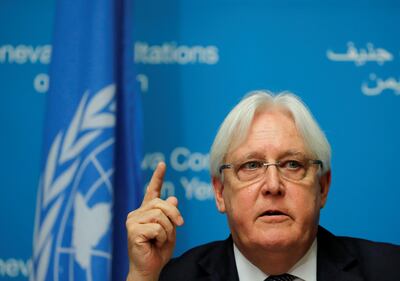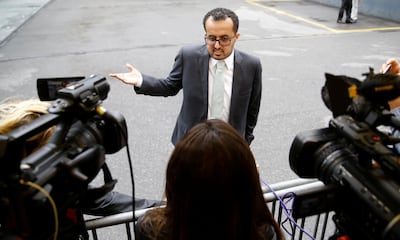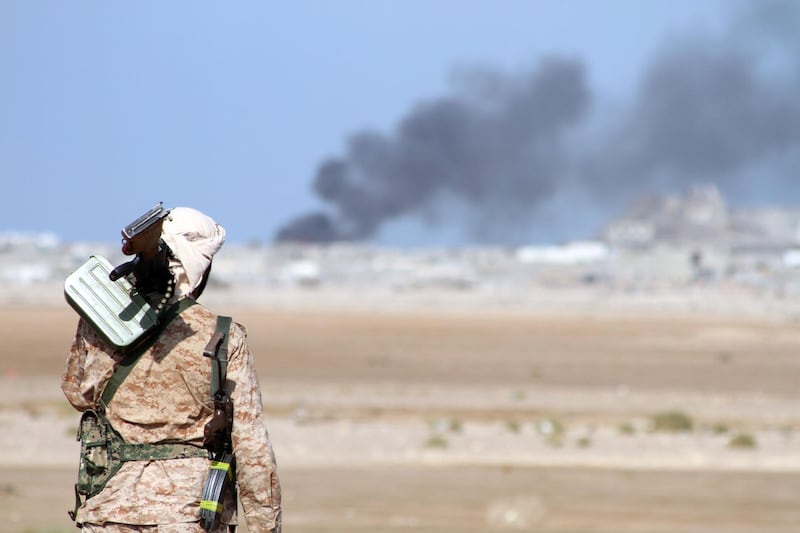The UN special envoy on Yemen held a second meeting with the government delegation in Geneva on Friday as a rebel no-show forced the launch of official negotiations to be cancelled for a second day.
Martin Griffiths and government negotiators led by Foreign Minister Khaled Al Yamani continued discussions on confidence-building measures, including the prisoner releases, humanitarian access, the reopening of Sanaa airport and economic issues.
The UN office in Geneva said Mr Griffiths was still working on getting the Houthi rebel negotiators to travel to the Swiss city.
However, no official negotiations were scheduled for Friday after the Houthi delegation refused to fly out of Sanaa without taking dozens of wounded fighters on board.
"No activities tied to the Geneva Consultations on Yemen are expected to take place at the Palais des Nations [on Friday]," the office of the UN special envoy said late on Thursday.
The delay could lead to the collapse of the planned talks, with the government team warning they would not wait for the rebels.
"Today should have been the first day of our consultation," Mr Al Yamani said on Thursday.
"We are not here indefinitely, we will not stay until the end of these consultations," he said. "Tomorrow we will take a decision on should we continue to stay in Geneva or should we withdraw."
______________
Geneva peace talks
Analysis: Unravelling the diplomatic steps needed for peace in Yemen
Editorial: Geneva talks offer best hope for Yemen peace
UN envoy to Yemen upbeat on peace talks despite delay
______________
Mr Griffiths had described the proximity talks between the two sides as "flickering signal of hope” for an end to the three-year war in which more than 10,000 Yemenis have been killed.
Diplomats said there was frustration at the last-minute Houthi demands, which first emerged just three days ago.
The list of conditions included transporting wounded rebels to Oman for treatment en route to Geneva and a guarantee that the delegation would be allowed to return home after the talks.
Mohammed Mousa Al Amiri, adviser to President Abdrabu Mansur Hadi and member of the government delegation, said Iran was the main reason these problems were occurring.

"All of what is happening in Yemen is due to Iran's influence. The Houthis' ideology, activities in Yemen are Iranian," Mr Al Amiri told The National.
“The Houthis don’t want to find peace, because they are sectarian and racist group, they don’t want to participate in talks or collaborate with others," he said.
“When they feel they they are losing ground, that’s when they resort to consultations and peace talks.”
A statement from Mr Griffiths stressed he remained hopeful that the impasse could be overcome in time and thanked the Yemeni government for its positive engagement in his efforts.
“The UN envoy is working on getting the Houthis to Geneva and efforts are being make to ensure the Houthis' presence, we are very hopeful,” it said.
The drive to use the talks as a launch pad for a peace process had the active backing of both regional and international diplomats, including the US Ambassador to Yemen Matthew Tueller.
While he refrained from commenting on the development, the Houthi refusal to attend was described by another official as a surprise and dismaying.
The UN-mediated talks in Geneva would be the first public meetings involving government and rebels delegations since 2016, when 108 days of negotiations in Kuwait failed to reach agreement on power-sharing.
The hosts aimed to build confidence between the government and the Houthis as a step towards more comprehensive peace negotiations. It was hoped that a series of small steps, such as the release of political prisoners and agreement on unifying central bank operations, would develop into a process that allowed the larger issues to be tackled in direct negotiations.
Having conducted months of shuttle diplomacy, Mr Griffiths felt that having the rival groupings in the same building would facilitate a breakthrough.

Failure to achieve even that will weigh on his efforts in the short run. Peace talks cannot be achieved if only one side is sitting at the table pointed out Joost Hiltermann, regional programme director for conflict monitoring organisation International Crisis Group.
"So it will depend on when they both will be prepared to come. In turn that depends on how much both sides want to move toward a negotiated solution," Mr Hiltermann told The National.
In one of a series of carefully choreographed moves, the UN Security Council on Wednesday night expressed full support to Mr Griffiths' efforts in leading the consultations to find a political settlement.
In a statement, the council called for a full implementation of UN Resolution 2216 that calls for the Houthis to return Sanaa to government control and demands the Houthis stop using Yemen as a base to attack neighbouring countries.
Yet as the statement emerged, the rebels launched a ballistic missile at the southern Saudi city of Najran on Wednesday night, injuring more than 20 people.
The Saudi-led coalition said the missile was intercepted by air defence forces but residents suffered mild injuries when shrapnel from the missile fell to earth, according to coalition spokesman Colonel Turki Al Malki.
“The Royal Saudi Air Defence Forces spotted the launch of the missile toward Najran and successfully intercepted and destroyed it. Houthi militias have so far fired 189 ballistic missiles toward the kingdom and these have resulted in the death of a total of 112 civilians, including citizens and expatriates, and injury of hundreds of others,” Col Al Maliki said.
Speaking in Abu Dhabi, Yemeni minister for human rights Mohammed Aksar said his ministry was preparing a report on abuses by the Houthis that would be released next week. Mr Askar also dismissed reports in rebel media that the Houthi delegation had not been given authorisation to fly out of Yemen.
Failure in Geneva could endanger efforts to address other effects of the war. Mohammed bin Humam, a former governor of Yemen's central bank, told The National that urgent efforts were needed to stabilise the economy.
The International Monetary Fund has been trying to arrange a meeting in Kenya next month to discuss the reunification of the central bank.
“We need assistance now, not just after the war,” he said. “If you unify the central bank, under one administration, that will bring confidence. Try to convince both parties to have one central bank, get involved with the international community.”





